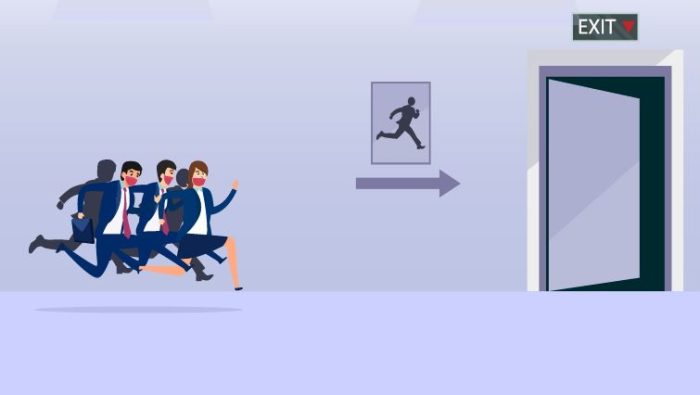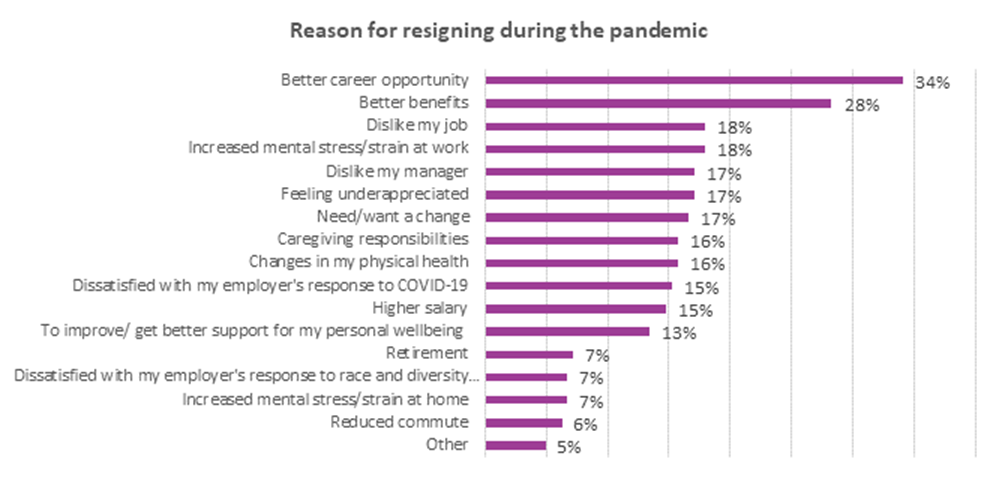Why People Quit Their Jobs During The Pandemic
 Publié le 16 December 2021
Publié le 16 December 2021
A new survey highlights the primary reasons why people quit their jobs during the pandemic. Understanding these reasons will help businesses meet the important needs of their employees.
The era of the Great Resignation is here. 2021 has seen people around the world leave their jobs at unprecedented rates. While there has always been a certain number of people who resigned from their jobs in any given year, the scale of these resignations has caught many by surprise. A recent survey by LifeWorks has analyzed the primary reasons people cite for leaving their jobs, which provides an interesting look at the issues that matter most to working professionals in all industries and sectors. By understanding why people quit their jobs during the pandemic, businesses can hopefully adapt to better meet the needs of their employees and keep highly skilled and qualified people as part of their workforce.
Why People Quit Their Jobs During The Pandemic:

Better Career Opportunity — 34%
It should come as no surprise that the most popular reason for people leaving their job is that they found a better one. This would likely be true even without the COVID-19 pandemic, as the ability to build a strong professional career is always highly valued. While many people who entered the workforces in the 1980’s and 1990’s consider working their way up over a decade at a single company to be the norm, studies have shown that the average person now stays at a job for only four years.
These trends become even more apparent with younger workers, with the average millennial staying in a job a little over two years. The data shows that for Canadian workers born after 1980, who already are the largest generation in the workforce, job hopping is the normal way to go. They understand the power that they have in the job market, and are not content to wait for one employer to recognize this and promote them. Rather, people today are much more likely to pursue opportunities where they can grow and reach their career goals at the pace they desire.
Better Benefits — 28%
While the salary offered by an employer is still a huge motivator when people decide to accept a job, the benefits that come with the job can have a large impact. Traditional benefits such as health insurance, dental coverage, RRSPs, sick leave and vacation days remain highly valued by prospective employees. Improving the standard benefits, i.e. more vacation times, improved health coverage, beyond the minimum is a great way to appeal to job candidates.
It is also important to adapt the job benefits offered in order to keep up with the changing needs of employees. This can mean offering flexible schedules, hybrid working and unlimited time off, insurance coverage related to mental and emotional well-being and more. Employee engagement surveys can be an effective way to learn which benefits are more valued by employees, and prioritize these in order to appeal to jobseekers. Given that more than a quarter of people quit their jobs during the pandemic cited improved benefits as the main reason, it is clear that employers must adapt their offerings in order to keep up with the needs of today’s workers.
Increased Mental Stress/Strain At Work — 18%
It should come as no surprise that the past year and a half has been incredibly stressful. The COVID-19 pandemic continues to affect and alter the daily lives of everyone everywhere, and has resulted in dramatic changes to the way millions of people work. There has been a noticeable uptick in stress and anxiety as a result of the pandemic, compounded by the removal of most barriers between work and home. Businesses in every sector have been faced with the challenge of adapting their practices to keep employees and customers safe while still allowing work to be performed and goals to be reached. While there has been much talk about supporting mental and emotional well-being, this is different from following through with concrete actions on the part of major employers. With nearly 1 in 5 people who leave their job doing so in order to avoid stress, it’s a sign that businesses need to do more to address stress-inducing situations in the workplace. The failure to do so will result in very qualified employees leaving their jobs, taking their skills and abilities with them.
Dislike My Manager — 17%
Everyone has likely dealt with an ineffective or poor manager at some point in their professional career. Bad managers, supervisors and leaders are not simply a nuisance, but rather can cause serious problems in the workplace. Ineffective managers can lead to increased stress and frustration for employees, which will have a negative impact on their well-being, the work they complete and the overall culture of the organization. Poor management can take many forms, but common traits include proposing improper deadlines or too much work, a lack of communication, micromanagement and more.
Effective managers understand that employees will be more motivated when their skills are respected, they feel they have an important voice, and there is the potential for growth in the role. With the transition to new forms of remote work during the pandemic, managers had to adapt to a new type of leadership, and those who were not able to do so only created problems in the virtual workplace. Many employees likely view this period as proof they could still be productive without constant in-person supervision and chose to move to a workplace that respected this fact.
Feeling Underappreciated — 17%
Nobody wants to feel invisible, and this includes when they are at work. In large companies and workplaces, it is far too easy for employees to start to feel like they are little more than interchangeable cogs in a machine. Feeling underappreciated and unrecognized at work leads to negative feelings, poor performance and a lack of motivation. Company leaders need to take extra steps to make sure that employees feel recognized and appreciated, especially with rising levels of feelings of isolation resulting from months of remote work.
This includes making sure to take special note of employee performance and achievements on a regular basis. Instead of waiting for the annual review, take time every week or at the very least every month to highlight important achievements. Doing so will help employees know that they play an important role and can continue to grow in their career, and they will be less likely to leave their job due to feeling unappreciated.
Caregiving Responsibilities — 16%
One of the major side effects of the pandemic was the necessity for people to take on caregiver roles for members of their family. This can include taking care of parents, siblings and extended family members with health issues, often related to age, who were and remain particularly at risk for COVID-19. One side-effect of the pandemic is that many people who left their jobs for caretaker responsibilities were women.
Over half a million women in Canada who had left their job as a result of the pandemic had not returned to work as of March 2021, and the number of women in long-term unemployment had tripled. Experts have expressed fears that it may result in the loss of hard-fought progress made by women in the workforce, and it is partially due to antiquated societal views regarding caregiving responsibilities. If businesses want to maintain a qualified and diverse workforce instead of losing highly skilled employees, they should seek any way possible to provide the flexibility that employees need to provide needed support and care in their personal lives while also continuing their professional careers.
Dissatisfied With My Employers Response to COVID-19 — 15%
People want to know that they work for a company that cares about them, and that is aware of the large role that businesses can play in society. This means that businesses must be willing to adapt to large-scale societal changes and take a stand on issues that matter to employees. The COVID-19 pandemic has forced inumerable changes on everyone, and businesses who act as though nothing is different will simply be left behind.
15% of people who left their jobs cite a lackluster response to the pandemic as a main reason. This could be a lack of safety protocols, inflexibility when it comes to remote work and scheduling, or it could be companies expecting their employees to be quiet and stay productive during an unprecedented global event. Those who did nothing to make employees feel safer during the pandemic proved that they are indifferent to the very real health concerns of their employees.
Reduced Commute — 6%
Long commutes to and from the office have been a bane to professionals for so long that complaining about is almost a cliche. Nevertheless, long commute times are quite common. For instance, the average commute in Toronto is 42 minutes each way, 28 minutes in Vancouver, and 30 minutes in Montreal. This means workers in these cities lose between 60-80 minutes every day just traveling to work and back home.
With the shift to remote work at the start of the pandemic, many people enjoyed having the opportunity to avoid traffic and having the extra time to improve their work-life balance. As various companies plan a return to the office, many employees were not that eager to return to daily traffic jams, weather problems and construction delays. Adapting hybrid working models, which require a lower amount of commuting time than a full-time return to the office, is one way that companies are trying to appeal to employees who are not fans of the daily commute.
If businesses are to retain the most qualified and skilled employees, they must adapt to people changing needs. Analyzing why people quit their jobs during the pandemic can help businesses understand the factors and issues that matter to their workforce. By making actionable changes to address these factors, there is a greater chance people will feel supported in the workplace, and businesses will maintain a satisfied and skilled workforce.







